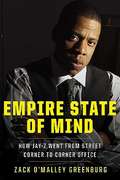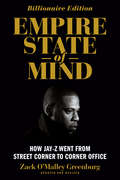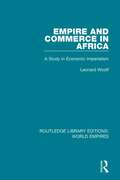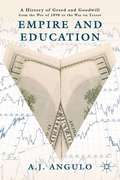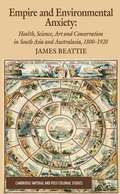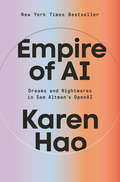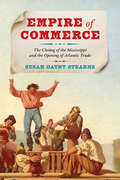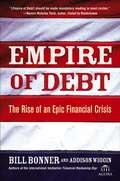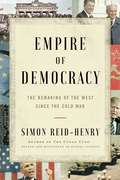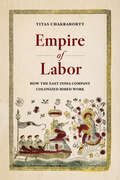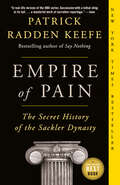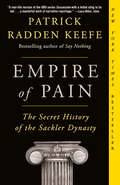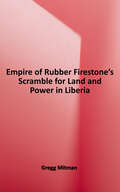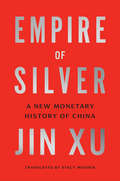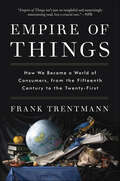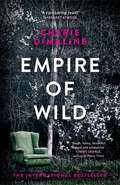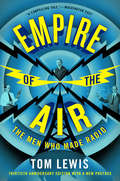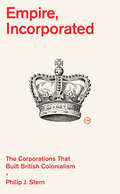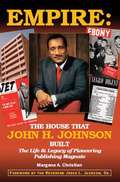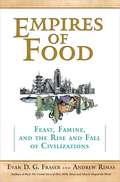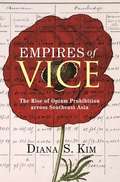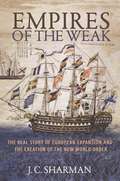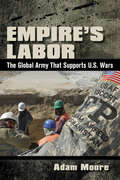- Table View
- List View
Empire State of Mind
by Greenburg Zack O'Malley"I'm not a businessman-I'm a business, man. " --Jay-Z Some people think Jay-Z is just another rapper. Others see him as just another celebrity/mega-star. The reality is, no matter what you think Jay-Z is, he first and foremost a business. And as much as Martha Stewart or Oprah, he has turned himself into a lifestyle. You can wake up to the local radio station playing Jay-Z's latest hit, spritz yourself with his 9IX cologne, slip on a pair of his Rocawear jeans, lace up your Reebok S. Carter sneakers, catch a Nets basketball game in the afternoon, and grab dinner at The Spotted Pig before heading to an evening performance of the Jay-Z-backed Broadway musical Fela! and a nightcap at his 40/40 Club. He'll profit at every turn of your day. But despite Jay-Z's success, there are still many Americans whose impressions of him are foggy, outdated, or downright incorrect. Surprisingly to many, he honed his business philosophy not at a fancy B school, but on the streets of Brooklyn, New York and beyond as a drug dealer in the 1980s. Empire State of Mind tells the story behind Jay-Z's rise to the top as told by the people who lived it with him- from classmates at Brooklyn's George Westinghouse High School; to the childhood friend who got him into the drug trade; to the DJ who convinced him to stop dealing and focus on music. This audio book explains just how Jay-Z propelled himself from the bleak streets of Brooklyn to the heights of the business world. Zack O'Malley Greenburg draws on his one-on-one interviews with hip-hop luminaries such as DJ Clark Kent, Questlove of The Roots, Damon Dash, Fred "Fab 5 Freddy" Brathwaite, MC Serch; NBA stars Jamal Crawford and Sebastian Telfair; and recording industry executives including Craig Kallman, CEO of Atlantic Records. He also includes new information on Jay-Z's various business dealings, such as: * The feature movie about Jay-Z and his first basketball team that was filmed by Fab 5 Freddy in 2003 but never released. * The Jay-Z branded Jeep that was scrapped just before going into production. * The real story behind his association with Armand de Brignac champagne. * The financial ramifications of his marriage to Beyonce. Jay-Z's tale is compelling not just because of his celebrity, but because it embodies the rags-to-riches American dream and is a model for any entrepreneur looking to build a commercial empire.
Empire State of Mind: How Jay Z Went from Street Corner to Corner Office, Revised Edition
by Steve Forbes Zack O'Malley Greenburg"I'm not a businessman-I'm a business, man." --Jay-Z Some people think Jay-Z is just another rapper. Others see him as just another celebrity/mega-star. The reality is, no matter what you think Jay-Z is, he first and foremost a business. And as much as Martha Stewart or Oprah, he has turned himself into a lifestyle. You can wake up to the local radio station playing Jay-Z's latest hit, spritz yourself with his 9IX cologne, slip on a pair of his Rocawear jeans, lace up your Reebok S. Carter sneakers, catch a Nets basketball game in the afternoon, and grab dinner at The Spotted Pig before heading to an evening performance of the Jay-Z-backed Broadway musical Fela! and a nightcap at his 40/40 Club. He'll profit at every turn of your day. But despite Jay-Z's success, there are still many Americans whose impressions of him are foggy, outdated, or downright incorrect. Surprisingly to many, he honed his business philosophy not at a fancy B school, but on the streets of Brooklyn, New York and beyond as a drug dealer in the 1980s. Empire State of Mind tells the story behind Jay-Z's rise to the top as told by the people who lived it with him- from classmates at Brooklyn's George Westinghouse High School; to the childhood friend who got him into the drug trade; to the DJ who convinced him to stop dealing and focus on music. This book explains just how Jay-Z propelled himself from the bleak streets of Brooklyn to the heights of the business world. Zack O'Malley Greenburg draws on his one-on-one interviews with hip-hop luminaries such as DJ Clark Kent, Questlove of The Roots, Damon Dash, Fred "Fab 5 Freddy" Brathwaite, MC Serch; NBA stars Jamal Crawford and Sebastian Telfair; and recording industry executives including Craig Kallman, CEO of Atlantic Records. He also includes new information on Jay-Z's various business dealings, such as: *The feature movie about Jay-Z and his first basketball team that was filmed by Fab 5 Freddy in 2003 but never released. *The Jay-Z branded Jeep that was scrapped just before going into production. *The real story behind his association with Armand de Brignac champagne. *The financial ramifications of his marriage to Beyonce. Jay-Z's tale is compelling not just because of his celebrity, but because it embodies the rags-to-riches American dream and is a model for any entrepreneur looking to build a commercial empire.
Empire and Commerce in Africa: A Study in Economic Imperialism (Routledge Library Editions: World Empires #16)
by Leonard WoolfIn this title, originally published in 1920, Leonard Woolf traces the history of economic imperialism and explores the relations of Europe and Africa since 1876. This analysis of economic imperialism helped to shape attitudes to colonialism for more than one generation of radicals and socialists, and still has the power to influence and inform today.
Empire and Education
by A. J. AnguloThis book is about education and American imperialism from the War of 1898 to the War on Terror. Very little coordinated or sustained research has been devoted to the broader contours of America, education, and empire. And third, this volume seeks to inspire new directions in the study of American educational history.
Empire and Environmental Anxiety
by James BeattieA new interpretation of imperialism and environmental change, and the anxieties imperialism generated through environmental transformation and interaction with unknown landscapes. Tying together South Asia and Australasia, this book demonstrates how environmental anxieties led to increasing state resource management, conservation, and urban reform.
Empire of AI: Dreams and Nightmares in Sam Altman's OpenAI
by Karen HaoFrom a brilliant longtime AI insider with intimate access to the world of Sam Altman's OpenAI from the beginning, an eye-opening account of arguably the most fateful tech arms race in history, reshaping the planet in real time, from the cockpit of the company that is driving the frenzyWhen AI expert and investigative journalist Karen Hao first began covering OpenAI in 2019, she thought they were the good guys. Founded as a nonprofit with safety enshrined as its core mission, the organization was meant, its leader Sam Altman told us, to act as a check against more purely mercantile, and potentially dangerous, forces. What could go wrong?Over time, Hao began to wrestle ever more deeply with that question. Increasingly, she realized that the core truth of this massively disruptive sector is that its vision of success requires an almost unprecedented amount of resources: the &“compute&” power of high-end chips and the processing capacity to create massive large language models, the sheer volume of data that needs to be amassed at scale, the humans &“cleaning up&” that data for sweatshop wages throughout the Global South, and a truly alarming spike in the usage of energy and water underlying it all. The truth is that we have entered a new and ominous age of empire: only a small handful of globally scaled companies can even enter the field of play. At the head of the pack with its ChatGPT breakthrough, how would OpenAI resist such temptations?Spoiler alert: it didn&’t. Armed with Microsoft&’s billions, OpenAI is setting a breakneck pace, chased by a small group of the most valuable companies in human history—toward what end, not even they can define. All this time, Hao has maintained her deep sourcing within the company and the industry, and so she was in intimate contact with the story that shocked the entire tech industry—Altman&’s sudden firing and triumphant return. The behind-the-scenes story of what happened, told here in full for the first time, is revelatory of who the people controlling this technology really are. But this isn&’t just the story of a single company, however fascinating it is. The g forces pressing down on the people of OpenAI are deforming the judgment of everyone else too—as such forces do. Naked power finds the ideology to cloak itself; no one thinks they&’re the bad guy. But in the meantime, as Hao shows through intrepid reporting on the ground around the world, the enormous wheels of extraction grind on. By drawing on the viewpoints of Silicon Valley engineers, Kenyan data laborers, and Chilean water activists, Hao presents the fullest picture of AI and its impact we&’ve seen to date, alongside a trenchant analysis of where things are headed. An astonishing eyewitness view from both up in the command capsule of the new economy and down where the real suffering happens, Empire of AI pierces the veil of the industry defining our era.
Empire of Commerce: The Closing of the Mississippi and the Opening of Atlantic Trade (Jeffersonian America)
by Susan Gaunt StearnsA groundbreaking study situating the Mississippi River valley at the heart of the early American republic&’s political economy Shortly after the ratification of the US Constitution in 1789, twenty-two-year-old Andrew Jackson pledged his allegiance to the king of Spain. Prior to the Louisiana Purchase, imperial control of the North American continent remained an open question. Spain controlled the Mississippi River, closing it to American trade in 1784, and western men on the make like Jackson had to navigate the overlapping economic and political forces at work with ruthless pragmatism. In Empire of Commerce, Susan Gaunt Stearns takes readers back to a time when there was nothing inevitable about the United States&’ untrammeled westward expansion. Her work demonstrates the centrality of trade on and along the Mississippi River to the complex development of the political and economic structures that shaped the nascent American republic. Stearns&’s perspective-shifting book reconfigures our understanding of key postrevolutionary moments—the writing of the Constitution, the outbreak of the Whiskey Rebellion, and the Louisiana Purchase—and demonstrates how the transatlantic cotton trade finally set the stage for transforming an imagined west into something real.
Empire of Debt: The Rise of an Epic Financial Crisis (Agora Series #58)
by Addison Wiggin Will BonnerIn Empire of Debt, maverick financial writers Bill Bonner and Addison Wiggin provide you with the first in-depth look at how the American character has shifted to accommodate its new imperial role; how we have abandoned the private virtues of personal liberty, economic freedom, and fiscal restraint; and how the government has gained control of public life and the economy.
Empire of Democracy: The Remaking of the West Since the Cold War
by Simon Reid-HenryThe first panoramic history of the Western world from the 1970s to the present day—from the Cold War to the 2008 financial crisis and wars in the Middle East—Empire of Democracy is &“a superbly informed and riveting historical analysis of our contemporary era&” (Charles S. Maier, Harvard University).Half a century ago, at the height of the Cold War and amidst a world economic crisis, the Western democracies were forced to undergo a profound transformation. Against what some saw as a full-scale &“crisis of democracy&”—with race riots, anti-Vietnam marches and a wave of worker discontent sowing crisis from one nation to the next—a new political-economic order was devised and the postwar social contract was torn up and written anew. In this epic narrative of the events that have shaped our own times, Simon Reid-Henry shows how liberal democracy, and western history with it, was profoundly reimagined when the postwar Golden Age ended. As the institutions of liberal rule were reinvented, a new generation of politicians emerged: Thatcher, Reagan, Mitterrand, Kohl. The late twentieth century heyday they oversaw carried the Western democracies triumphantly to victory in the Cold War and into the economic boom of the 1990s. But equally it led them into the fiasco of Iraq, to the high drama of the financial crisis in 2007/8, and ultimately to the anti-liberal surge of our own times. The present crisis of liberalism is leading us toward as yet unscripted decades. The era we have all been living through is closing out, and democracy is turning on its axis once again. &“Brilliantly, Reid-Henry calls for the salvation of democracy from the choices of its own leaders if it is to survive&” (Samuel Moyn, Yale University).
Empire of Labor: How the East India Company Colonized Hired Work
by Titas ChakrabortyEmpire of Labor tells the story of how hired workers experienced and responded to the rise to power over the long eighteenth century of the English East India Company (EIC), which perennially hired thousands of people in and around its settlements in Bengal. Focusing on boatmen and silk reelers as well as sailors and soldiers—a remarkable look at both indigenous and European workers—the story begins with the earliest accounts of the EIC's dealings with hired labor in the region, from 1651. Prior to EIC dominance, hired workers drove hard bargains with their employers, making demands that drew upon their own notions of wages, work rhythms, and time. When their demands were not met, they ran away, often to rival indigenous or European employers. Empire of Labor explores these demands and how they conflicted with the EIC's notions of discipline. Analyzing Bengali literary sources and Dutch and English archival materials, the book rethinks the ascendancy of the company state as a violent process involving removing competing employers, imposing army and police power, introducing new production technologies, and instituting draconian regulations which eliminated indigenous cultures of work. Most importantly, it depicts the lifeworlds of these recalcitrant workers, showing how they lived and resisted. A major intervention in histories of colonialism, labor, migration, and law, Empire of Labor ultimately recasts colonial rule as a novel form of state-labor relationship.
Empire of Pain: The Secret History of the Sackler Dynasty
by Patrick Radden KeefeThe highly anticipated portrait of three generations of the Sackler family, by the prize-winning, bestselling author of SAY NOTHING The Sackler name adorns the walls of many storied institutions: Harvard, the Metropolitan Museum of Art, Oxford, the Louvre. They are one of the richest families in the world, known for their lavish donations to the arts and sciences. The source of the family fortune was vague, however, until it emerged that the Sacklers were responsible for making and marketing OxyContin, a blockbuster painkiller that was a catalyst for the opioid crisis. Empire of Pain is a masterpiece of narrative reporting and writing, exhaustively documented and ferociously compelling.
Empire of Pain: The Secret History of the Sackler Dynasty
by Patrick Radden KeefeNEW YORK TIMES BESTSELLER • A NEW YORK TIMES NOTABLE BOOK OF THE YEAR • A grand, devastating portrait of three generations of the Sackler family, famed for their philanthropy, whose fortune was built by Valium and whose reputation was destroyed by OxyContin. From the prize-winning and bestselling author of Say Nothing."A real-life version of the HBO series Succession with a lethal sting in its tail…a masterful work of narrative reportage.&” – Laura Miller, Slate The history of the Sackler dynasty is rife with drama—baroque personal lives; bitter disputes over estates; fistfights in boardrooms; glittering art collections; Machiavellian courtroom maneuvers; and the calculated use of money to burnish reputations and crush the less powerful. The Sackler name has adorned the walls of many storied institutions—Harvard, the Metropolitan Museum of Art, Oxford, the Louvre. They are one of the richest families in the world, but the source of the family fortune was vague—until it emerged that the Sacklers were responsible for making and marketing a blockbuster painkiller that was the catalyst for the opioid crisis.Empire of Pain is the saga of three generations of a single family and the mark they would leave on the world, a tale that moves from the bustling streets of early twentieth-century Brooklyn to the seaside palaces of Greenwich, Connecticut, and Cap d&’Antibes to the corridors of power in Washington, D.C. It follows the family&’s early success with Valium to the much more potent OxyContin, marketed with a ruthless technique of co-opting doctors, influencing the FDA, downplaying the drug&’s addictiveness. Empire of Pain chronicles the multiple investigations of the Sacklers and their company, and the scorched-earth legal tactics that the family has used to evade accountability.A masterpiece of narrative reporting, Empire of Pain is a ferociously compelling portrait of America&’s second Gilded Age, a study of impunity among the super-elite and a relentless investigation of the naked greed that built one of the world&’s great fortunes.
Empire of Rubber: Firestone's Scramble for Land and Power in Liberia
by Gregg MitmanAn ambitious and shocking exposé of America's hidden empire in Liberia, run by the storied Firestone corporation, and its long shadow in the early 1920s, Americans owned 80 percent of the world's automobiles and consumed 75 percent of the world's rubber. But only one percent of the world's rubber grew under the U.S. flag, creating a bottleneck that hampered the nation's explosive economic expansion. To solve its conundrum, the Firestone Tire and Rubber Company turned to a tiny West African nation, Liberia, founded in 1847 as a free Black republic. <p><p>Empire of Rubber tells a sweeping story of capitalism, racial exploitation, and environmental devastation, as Firestone transformed Liberia into America's rubber empire. Historian and filmmaker Gregg Mitman scoured remote archives to unearth a history of promises unfulfilled for the vast numbers of Liberians who toiled on rubber plantations built on taken land. Mitman reveals a history of racial segregation and medical experimentation that reflected Jim Crow America--on African soil. As Firestone reaped fortunes, wealth and power concentrated in the hands of a few elites, fostering widespread inequalities that fed unrest, rebellions, and, eventually, civil war. A riveting narrative of ecology and disease, of commerce and science, and of racial politics and political maneuvering, Empire of Rubber uncovers the hidden story of a corporate empire whose tentacles reach into the present.
Empire of Silver: A New Monetary History of China
by Jin XuA thousand-year history of how China&’s obsession with silver influenced the country&’s financial well-being, global standing, and political stability This revelatory account of the ways silver shaped Chinese history shows how an obsession with &“white metal&” held China back from financial modernization. First used as currency during the Song dynasty in around 900 CE, silver gradually became central to China&’s economic framework and was officially monetized in the middle of the Ming dynasty during the sixteenth century. However, due to the early adoption of paper money in China, silver was not formed into coins but became a cumbersome &“weighing currency,&” for which ingots had to be constantly examined for weight and purity—an unwieldy practice that lasted for centuries. While China&’s interest in silver spurred new avenues of trade and helped increase the country&’s global economic footprint, Jin Xu argues that, in the long run, silver played a key role in the struggles and entanglements that led to the decline of the Chinese empire.
Empire of Things: How We Became a World of Consumers, from the Fifteenth Century to the Twenty-First
by Frank TrentmannWhat we consume has become a central—perhaps the central—feature of modern life. Our economies live or die by spending, we increasingly define ourselves by our possessions, and this ever-richer lifestyle has had an extraordinary impact on our planet. How have we come to live with so much stuff, and how has this changed the course of history?In Empire of Things, Frank Trentmann unfolds the extraordinary story of our modern material world, from Renaissance Italy and late Ming China to today’s global economy. While consumption is often portrayed as a recent American export, this monumental and richly detailed account shows that it is in fact a truly international phenomenon with a much longer and more diverse history. Trentmann traces the influence of trade and empire on tastes, as formerly exotic goods like coffee, tobacco, Indian cotton and Chinese porcelain conquered the world, and explores the growing demand for home furnishings, fashionable clothes and convenience that transformed private and public life. The nineteenth and twentieth centuries brought department stores, credit cards and advertising, but also the rise of the ethical shopper, new generational identities and, eventually, the resurgence of the Asian consumer.With an eye to the present and future, Frank Trentmann provides a long view on the global challenges of our relentless pursuit of more—from waste and debt to stress and inequality. A masterpiece of research and storytelling many years in the making, Empire of Things recounts the epic history of the goods that have seduced, enriched and unsettled our lives over the past six hundred years.
Empire of Wild: A Novel
by Cherie DimalineA #1 INTERNATIONAL BESTSELLEROne of the most anticipated books of the summer for Time, Harper's Bazaar, Bustle and Publishers Weekly'Deftly written, gripping and informative. Empire of Wild is a rip-roaring read!' Margaret Atwood'Empire of Wild is doing everything I love in a contemporary novel and more. It is tough, funny, beautiful, honest and propulsive' Tommy Orange, author of There There 'Dimaline turns an old story into something newly haunting and resonant' New York Times'Close, tight, stark, beautiful - rich where richness is warranted, but spare where want and sorrow have sharpened every word. Dimaline has crafted something both current and timeless' NPR'Revelatory... Gritty and engaging, this story of a woman and her missing husband is one of candor, wit and tradition'Ms. Magazine Broken-hearted Joan has been searching for her husband, Victor, for almost a year - ever since he went missing on the night they had their first serious argument. One hung-over morning in a Walmart parking lot in a little town near Georgian Bay, she is drawn to a revival tent where the local Métis have been flocking to hear a charismatic preacher. By the time she staggers into the tent the service is over, but as she is about to leave, she hears an unmistakable voice.She turns, and there is Victor. Only he insists he is not Victor, but the Reverend Eugene Wolff, on a mission to bring his people to Jesus.With only two allies - her Johnny-Cash-loving, 12-year-old nephew Zeus, and Ajean, a foul-mouthed euchre shark with deep knowledge of the old Métis ways - Joan sets out to remind the Reverend Wolff of who he really is. If he really is Victor, his life and the life of everyone she loves, depends upon her success.Inspired by traditional Métis legends, Cherie Dimaline has created a propulsive, stunning and sensuous novel.
Empire of the Air: The Men Who Made Radio
by Tom LewisEmpire of the Air tells the story of three American visionaries—Lee de Forest, Edwin Howard Armstrong, and David Sarnoff—whose imagination and dreams turned a hobbyist's toy into radio, launching the modern communications age. Tom Lewis weaves the story of these men and their achievements into a richly detailed and moving narrative that spans the first half of the twentieth century, a time when the American romance with science and technology was at its peak. Empire of the Air is a tale of pioneers on the frontier of a new technology, of American entrepreneurial spirit, and of the tragic collision between inventor and corporation.
Empire, Incorporated: The Corporations That Built British Colonialism
by Philip J. Stern“Brilliant, ambitious, and often surprising. A remarkable contribution to the current global debate about Empire and a small masterpiece of research and conceptual reimagining.”—William Dalrymple, author of The Anarchy: The East India Company, Corporate Violence, and the Pillage of an EmpireAn award-winning historian places the corporation—more than the Crown—at the heart of British colonialism, arguing that companies built and governed global empire, raising questions about public and private power that were just as troubling four hundred years ago as they are today.Across four centuries, from Ireland to India, the Americas to Africa and Australia, British colonialism was above all the business of corporations. Corporations conceived, promoted, financed, and governed overseas expansion, making claims over territory and peoples while ensuring that British and colonial society were invested, quite literally, in their ventures. Colonial companies were also relentlessly controversial, frequently in debt, and prone to failure. The corporation was well-suited to overseas expansion not because it was an inevitable juggernaut but because, like empire itself, it was an elusive contradiction: public and private; person and society; subordinate and autonomous; centralized and diffuse; immortal and precarious; national and cosmopolitan—a legal fiction with very real power.Breaking from traditional histories in which corporations take a supporting role by doing the dirty work of sovereign states in exchange for commercial monopolies, Philip Stern argues that corporations took the lead in global expansion and administration. Whether in sixteenth-century Ireland and North America or the Falklands in the early 1980s, corporations were key players. And, as Empire, Incorporated makes clear, venture colonialism did not cease with the end of empire. Its legacies continue to raise questions about corporate power that are just as relevant today as they were 400 years ago.Challenging conventional wisdom about where power is held on a global scale, Stern complicates the supposedly firm distinction between private enterprise and the state, offering a new history of the British Empire, as well as a new history of the corporation.
Empire: The Life and Legacy of Pioneering Publishing Magnate: The House that John H. Johnson Built
by Margena A. ChristianAfrican-American stories were overlooked by mainstream media until John H. Johnson showed the world the value of black life. In his magazines EBONY and JET, the publisher and businessman presented never-before-told accounts and used captivating, memorable images to share stories of black people. Margena A. Christian conducts extensive archival research, drawing upon rare sources and a personal decade-long relationship as an employee under the direct tutelage of Johnson. She meticulously constructs the complex story of what made the founder of these magazines become one of history's greatest publishers and businessmen. He went on to become the first black person named to the Forbes 400 richest Americans and amassed an empire, ranging from publishing, cosmetics, travel, radio stations, TV shows, hair care products, and the world's largest traveling fashion show.
Empires and Bureaucracy in World History
by Crooks, Peter and Parsons, Timothy H. Peter Crooks Timothy H. ParsonsHow did empires rule different peoples across vast expanses of space and time? And how did small numbers of imperial bureaucrats govern large numbers of subordinated peoples? Empires and Bureaucracy in World History seeks answers to these fundamental problems in imperial studies by exploring the power and limits of bureaucracy. The book is pioneering in bringing together historians of antiquity and the Middle Ages with scholars of post-medieval European empires, while a genuinely world-historical perspective is provided by chapters on China, the Incas and the Ottomans. The editors identify a paradox in how bureaucracy operated on the scale of empires and so help explain why some empires endured for centuries while, in the contemporary world, empires fail almost before they begin. By adopting a cross-chronological and world-historical approach, the book challenges the abiding association of bureaucratic rationality with 'modernity' and the so-called 'Rise of the West'.
Empires of Food: Feast, Famine, and the Rise and Fall of Civilizations
by Andrew Rimas Evan FraserWe are what we eat: this aphorism contains a profound truth about civilization, one that has played out on the world historical stage over many millennia of human endeavor. Using the colorful diaries of a sixteenth-century merchant as a narrative guide, Empires of Food vividly chronicles the fate of people and societies for the past twelve thousand years through the foods they grew, hunted, traded, and ate—and gives us fascinating, and devastating, insights into what to expect in years to come. In energetic prose, agricultural expert Evan D. G. Fraser and journalist Andrew Rimas tell gripping stories that capture the flavor of places as disparate as ancient Mesopotamia and imperial Britain, taking us from the first city in the once-thriving Fertile Crescent to today’s overworked breadbaskets and rice bowls in the United States and China, showing just what food has meant to humanity. Cities, culture, art, government, and religion are founded on the creation and exchange of food surpluses, complex societies built by shipping corn and wheat and rice up rivers and into the stewpots of history’s generations. But eventually, inevitably, the crops fail, the fields erode, or the temperature drops, and the center of power shifts. Cultures descend into dark ages of poverty, famine, and war. It happened at the end of the Roman Empire, when slave plantations overworked Europe’s and Egypt’s soil and drained its vigor. It happened to the Mayans, who abandoned their great cities during centuries of drought. It happened in the fourteenth century, when medieval societies crashed in famine and plague, and again in the nineteenth century, when catastrophic colonial schemes plunged half the world into a poverty from which it has never recovered. And today, even though we live in an age of astounding agricultural productivity and genetically modified crops, our food supplies are once again in peril. Empires of Food brilliantly recounts the history of cyclic consumption, but it is also the story of the future; of, for example, how a shrimp boat hauling up an empty net in the Mekong Delta could spark a riot in the Caribbean. It tells what happens when a culture or nation runs out of food—and shows us the face of the world turned hungry. The authors argue that neither local food movements nor free market economists will stave off the next crash, and they propose their own solutions. A fascinating, fresh history told through the prism of the dining table, Empires of Food offers a grand scope and a provocative analysis of the world today, indispensable in this time of global warming and food crises.
Empires of Vice: The Rise of Opium Prohibition across Southeast Asia (Histories of Economic Life #22)
by Professor Diana S. KimA history of opium's dramatic fall from favor in colonial Southeast AsiaDuring the late nineteenth century, opium was integral to European colonial rule in Southeast Asia. The taxation of opium was a major source of revenue for British and French colonizers, who also derived moral authority from imposing a tax on a peculiar vice of their non-European subjects. Yet between the 1890s and the 1940s, colonial states began to ban opium, upsetting the very foundations of overseas rule—how did this happen? Empires of Vice traces the history of this dramatic reversal, revealing the colonial legacies that set the stage for the region's drug problems today.Diana Kim challenges the conventional wisdom about opium prohibition—that it came about because doctors awoke to the dangers of drug addiction or that it was a response to moral crusaders—uncovering a more complex story deep within the colonial bureaucracy. Drawing on a wealth of archival evidence across Southeast Asia and Europe, she shows how prohibition was made possible by the pivotal contributions of seemingly weak bureaucratic officials. Comparing British and French experiences across today's Burma, Cambodia, Laos, Malaysia, Singapore, and Vietnam, Kim examines how the everyday work of local administrators delegitimized the taxing of opium, which in turn made major anti-opium reforms possible.Empires of Vice reveals the inner life of colonial bureaucracy, illuminating how European rulers reconfigured their opium-entangled foundations of governance and shaped Southeast Asia's political economy of illicit drugs and the punitive state.
Empires of the Weak: The Real Story of European Expansion and the Creation of the New World Order
by Jason SharmanHow the rise of the West was a temporary exception to the predominant world orderWhat accounts for the rise of the state, the creation of the first global system, and the dominance of the West? The conventional answer asserts that superior technology, tactics, and institutions forged by Darwinian military competition gave Europeans a decisive advantage in war over other civilizations from 1500 onward. In contrast, Empires of the Weak argues that Europeans actually had no general military superiority in the early modern era. J. C. Sharman shows instead that European expansion from the late fifteenth to the late eighteenth centuries is better explained by deference to strong Asian and African polities, disease in the Americas, and maritime supremacy earned by default because local land-oriented polities were largely indifferent to war and trade at sea.Europeans were overawed by the mighty Eastern empires of the day, which pioneered key military innovations and were the greatest early modern conquerors. Against the view that the Europeans won for all time, Sharman contends that the imperialism of the late nineteenth and early twentieth centuries was a relatively transient and anomalous development in world politics that concluded with Western losses in various insurgencies. If the twenty-first century is to be dominated by non-Western powers like China, this represents a return to the norm for the modern era.Bringing a revisionist perspective to the idea that Europe ruled the world due to military dominance, Empires of the Weak demonstrates that the rise of the West was an exception in the prevailing world order.
Empire’s Labor: The Global Army That Supports U.S. Wars
by Adam MooreIn a dramatic unveiling of the little-known world of contracted military logistics, Adam Moore examines the lives of the global army of laborers who support US overseas wars. Empire's Labor brings us the experience of the hundreds of thousands of men and women who perform jobs such as truck drivers and administrative assistants at bases located in warzones in the Middle East and Africa. He highlights the changes the US military has undergone since the Vietnam War, when the ratio of contractors to uniformed personnel was roughly 1:6. In Afghanistan it has been as high as 4:1. This growth in logistics contracting represents a fundamental change in how the US fights wars, with the military now dependent on a huge pool of contractors recruited from around the world. It also, Moore demonstrates, has social, economic, and political implications that extend well beyond the battlefields.Focusing on workers from the Philippines and Bosnia, two major sources of "third country national" (TCN) military labor, Moore explains the rise of large-scale logistics outsourcing since the end of the Cold War; describes the networks, infrastructures, and practices that span the spaces through which people, information, and goods circulate; and reveals the experiences of foreign workers, from the hidden dynamics of labor activism on bases, to the economic and social impacts these jobs have on their families and the communities they hail from. Through his extensive fieldwork and interviews, Moore gives voice to the agency and aspirations of the many thousands of foreigners who labor for the US military.Thanks to generous funding from UCLA and its participation in TOME (Toward an Open Monograph Ecosystem), the ebook editions of this book are available as Open Access volumes from Cornell Open (cornellopen.org) and other repositories.
